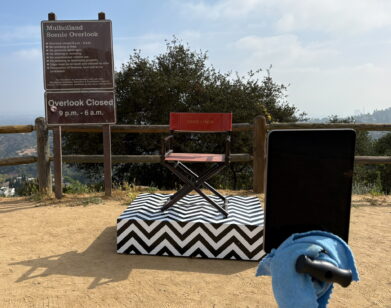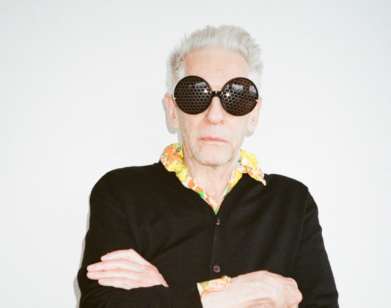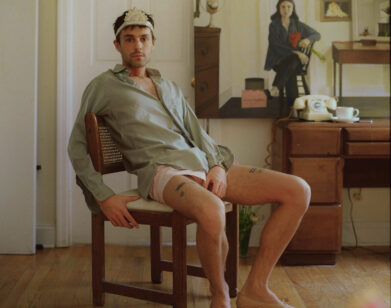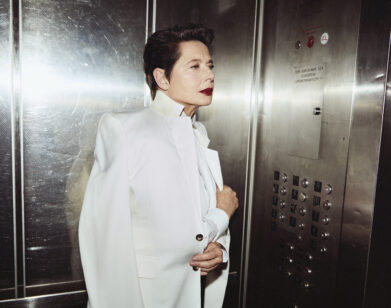q&a
Sean Bonnette of AJJ Wants to Call Joe Biden on a Banana Phone
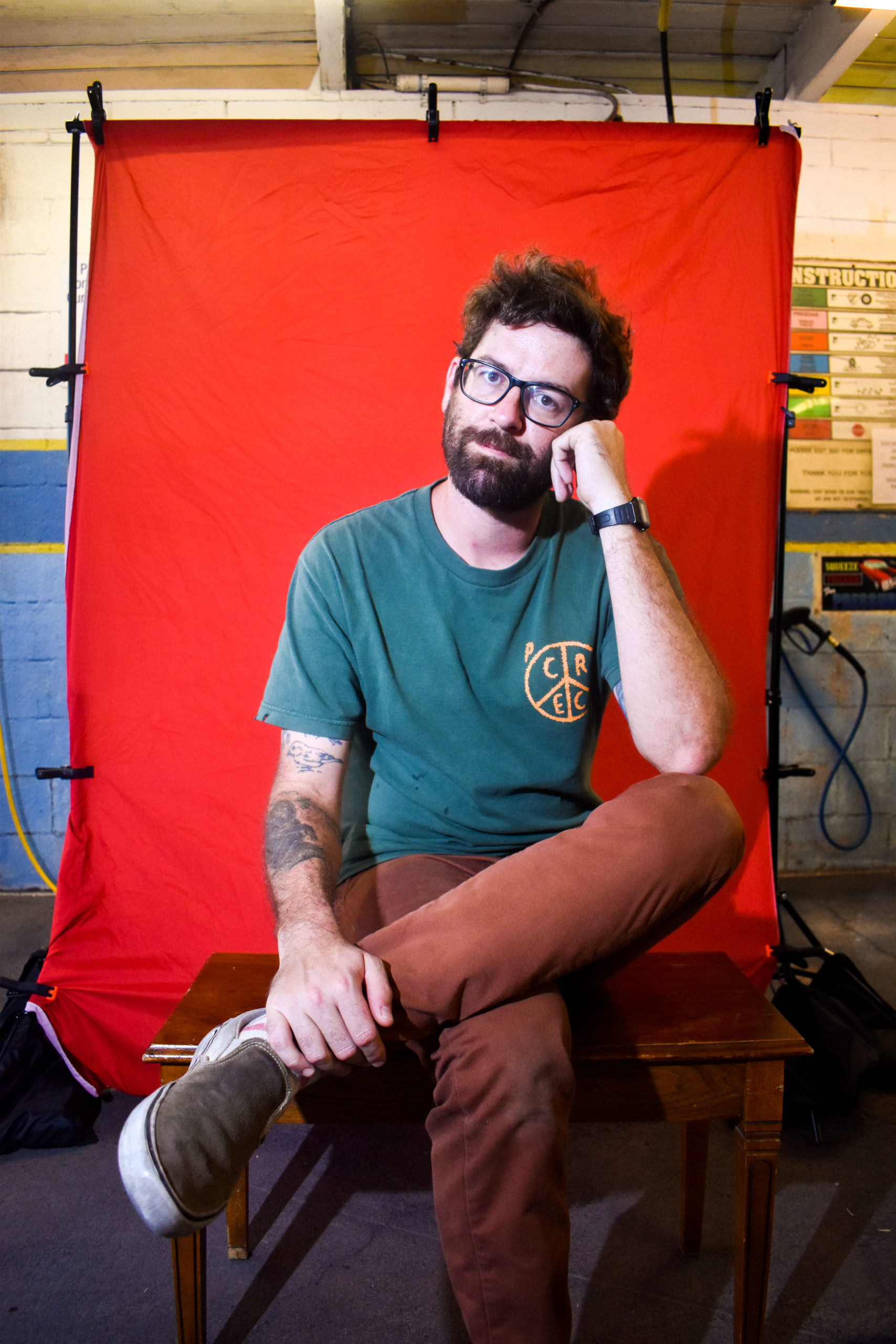
Photos by R. Ariel.
If you had asked Sean Bonnette how he envisioned spending the past year, he probably wouldn’t have imagined spending every night singing to his cell phone instead of a crowd. These days, the singer-songwriter frontman of AJJ—formerly known as Andrew Jackson Jihad—can most often be heard on Instagram Live, playing music from the comfort of his home. AJJ rose to prominence in the early 2000s, in the “folk-punk” scene, alongside bands like Defiance, Ohio, and Pat the Bunny. Bonnette made a name for himself spitting out pitch-dark lyrics like, “You will cough up crows that peck my eyes/And I will do nothing but go blind” and strumming at lightning speed. That said, one might be surprised to find that Bonnette is… well, a real sweetheart. In our conversation, he was affable and thoughtfully inquisitive, and we spent more time talking about the children’s entertainer Raffi (“Baby Beluga,” “Down By the Bay”) than punk rock. As he admitted to me, he’s the “less-punk” member of the band, which started out as a two-piece with his friend Ben Gallaty and has grown over the years to five members total. AJJ’s music has always been a source of a lot of hope and affirmation for its fans. Their most recent album, aptly titled Good Luck Everybody, was released in January of 2020, before shit really hit the fan. Since then, it’s only grown more resonant. Bonnette spoke to me from the parking lot of a music studio, after finishing a quick skate sesh. We talked about his influences, mellowing out, and his year of playing songs online.
———
CONOR WILLIAMS: First of all, congrats on getting the vax!
SEAN BONNETTE: Thank you very much!
WILLIAMS: Did it feel good?
BONNETTE: It didn’t for the first couple of days, but it hurt good.
WILLIAMS: It’s a bit strange to be talking to someone I’ve been watching on my screen just about every week since last March. Can you talk a bit about what you’ve been up to for the past year?
BONNETTE: Let’s see. Where do I start? The last tour I went on was in February of 2020. It was a really, really good tour to go out on. We clicked really well with the band and the shows were really fun. The last show we played was Flagstaff Arizona, I think February 18th. It was incredible. That was a good show to go out on because it was very humbling. Our cellist Mark tweeted, “What’s touring like?” And then showed what the bathroom was like—three out of order toilets and a smashed sink. Yeah, we had karaoke. It was very, very celebratory. Didn’t really give too much thought to the specter that had been looming over the tour, which was coronavirus. That was still an abstract concept at the time. It couldn’t possibly touch America! And then it did. And so the day that we had decided to cancel the tour, I was bummed out, and so I went on to Instagram Live on my back porch and played like five songs, just as a way to kind of soothe myself and reassure people, and kind of apologize for canceling our tour. But then the next night, I did it again…and…again. And I kind of decided to keep doing it for the length of the tour that had been canceled, because I had already set my mind on playing music every day for some sort of audience. But then after that postponed date was over, I just kept doing it. For the first hundred days, I played every night. And then from then, I decided to move to three nights a week so that I could have more time to record and write stuff, since I was already pretty warmed up. And now I’ve been doing about three performances a week, maybe less, maybe more, depending on what other opportunities have jumped out at the time. And it’ll be a year on Monday.
WILLIAMS: Congratulations.
BONNETTE: I figured at some point, people are bored, I’m bored, people want to be entertained, I like to entertain, and I like playing music in front of an audience whether I can see them or not. It feels really nice to sing the song in my heart.
WILLIAMS: Well, I’ve been watching the videos probably nearly every week. There’s two things I’ve been watching since the beginning of all this: your videos, and David Lynch’s Daily Weather Report on YouTube.
BONNETTE: [Laughs] I’ve caught a couple of those. Great company to be in!
WILLIAMS: You’ve been doing these videos at home. Is your wife ever bothered by it, or does she appreciate a constant stream of music in the household?
BONNETTE: She’s very supportive of it, but that’s probably because it’s a separate dwelling. It’s a little guest house. But I do use her phone for the second camera for the YouTube version of it. So sometimes she’s put out if I take too long getting the file to upload and she can’t look at TikTok.
WILLIAMS: You’ve used these livestreams to raise funds for a lot of different causes. Would you like to talk about some of those organizations?
BONNETTE: One of the organizations we raise money for is called Teen Lifeline. I’m sure fans of the band that are reading this interview have heard me talk about it before, but it’s a suicide and crisis hotline that I started volunteering at when I was a youth, like fifteen. Then I eventually got a degree and ended up working there. It was one of my last real jobs before I became a band hustler. So I always love to support them and give back because they had a tremendous impact on my life as a volunteer, and they do a lot of good work for both the teens that volunteer for them and for the callers.
It’s really fun and cool that Instagram allows you to do fundraisers, but they only allow fundraisers for certain accredited nonprofits. I think it would be neater if they just opened it up for everybody, so that if you had a friend who needs help with rent or a medical procedure, you could just do a fundraiser directly to them and their Venmo. It’s harder to direct to someone else’s Venmo because people like to see the money grow. That kind of snowball effect helps the impact a lot. Also, lately, I’m more into the idea of straight up mutual aid or going directly to people, particularly when it comes to Black power-building and reparations, all the stuff we’ve been working harder on since the summer.
WILLIAMS: I went to see AJJ in Connecticut when I was seventeen years old. You guys were still Andrew Jackson Jihad back then. It was 2012 and I remember seeing Kony 2012 stickers on the way, and I remember that there was a Brokencyde concert happening at the venue next door—
BONNETTE: Oh, yeah! We got kicked out of that! [Laughs]
WILLIAMS: It was very strange to see all of the scene kids lined up next to the hipsters outside their respective venues. Joyce Manor opened for you guys then, and that was the first mosh pit I’d ever been in. Who did you listen to when you were seventeen?
BONNETTE: By that point, I had already snobbed out of nü-metal and stuff, before I came back in in my thirties. I was really into the distinction between emo and indie rock. I didn’t like emo, and I didn’t listen to bands that most people considered emo, although since it’s completely arbitrary and certainly bullshit, there are lots of “emo” bands I listened to. Pedro the Lion, Bright Eyes, Pavement … I did have a lot of older influence in my musical taste. My mom was pretty young, so I was really into The Pixies and The Dead Milkmen. I had a tape player in my car and I had a lot of old rap tapes. Early ’90s gangster rap—Death Certificate by Ice Cube, Public Enemy’s It Takes a Nation of Millions… My first mosh pit, I was like, thirteen, I think, at a VFW show when I lived in Rochester, Minnesota, for a minute. And I got knocked down, and I got picked back up, and I was like, “This is cool.”
WILLIAMS: Just as Chumbawumba foretold.
BONNETTE: Yeah! [Laughs]
WILLIAMS: You’ve been performing a ton of really great covers in these videos. It’s been cool to get a glimpse into your own musical taste and influences. You’ve put out singles of “Candy Jail” by Silver Jews, and “You Swan Go On” by Mount Eerie. Who are some of your influences outside of songwriting? Like, outside of music?
BONNETTE: I also really like David Lynch. More than even the work, I admire his approach.
WILLIAMS: “The art life.”
BONNETTE: Yeah! Very easy-going and lackadaisical, and permissive. He’s a big one. I tend to get fixated on movies. The last two movies that really grabbed me were Annihilation and Mad Max: Fury Road. I saw both of those in the theaters a bunch of times. As far as books, Kurt Vonnegut influenced my worldview a considerable amount even though it’s been some years since I returned. Same with C.S. Lewis. I like his style. Another person I admire a lot for their approach is Wayne White, the artist. He’s kind of like a liberal, good ol’ boy who does a lot of work with childlike stuff, like cardboard. He worked on Pee-wee’s Playhouse, and the “Tonight, Tonight,” video by Smashing Pumpkins.
WILLIAMS: Someone in the comments of one of your videos suggested you do an album of covers or a collaboration with folk singer and Antifa legend Raffi. Would you be down?
BONNETTE: Of course. No question. There are multiple phases in my life where I’ve appreciated Raffi. Of course, as a child, later in my early twenties, getting drunk in my apartment with my roommates watching the Blue Tape—you know, the one where he wears the blue shirt? I think that was Singable Songs for the Very Young—and just admiring his stagecraft, and the piercing look in his eyes as he holds all of these children captive. And now I’m a dad. I have an almost two year-old, so I play Raffi songs for him. Big fan of Raffi. I’m glad he’s in Antifa.
WILLIAMS: Presumably, you’re not playing any of your music for your two year-old.
BONNETTE: Oh, I am.
WILLIAMS: Oh, yeah? Does he have any favorites?
BONNETTE: He’s not able to make requests yet, but he’ll walk over the guitar and point at it and say “Daddy!” and then I’ll pick it up and play something.
WILLIAMS: What are your top five Neil Young songs?
BONNETTE: “Tell Me Why,” “Mellow My Mind,” “Powderfinger,” “Everybody Knows This is Nowhere,” and “Lookin’ for a Love.” Ask me again tomorrow, and it’ll be different.
WILLIAMS: In my estimation, after your album Knife Man, and with the decision to simply go by AJJ, it feels like, to me, that your music softened up a little. As Andrew Jackson Jihad, there was almost a violence to your lyrics, and your delivery was much more shouty. This isn’t to say that the themes your music explores have changed all that drastically over the years, but it does feel like you’ve let kindness come through a bit more. Would you agree?
BONNETTE: Yeah, I think I definitely would. The space between Knife Man and Christmas Island, I mean of course there was definitely a sonic shift. We changed engineers and producers. Our new producer John Congleton probably would have preferred the violence. He’s a pretty violent guy. Artistically speaking! [Laughs] He was the frontman of The Paper Chase, the most violent band ever, musically. But a bunch of things happened between those albums. Moving away, and therefore our band practicing and performing together live a lot less, which I think gave me a lot more influence over the songwriting and sound. I’m the less-punk member of Andrew Jackson—uh… JJ. Ben [Gallaty, the other founding member of AJJ] is punker than me, for sure. Also, I softened up in the way that I became more open to forgiveness.
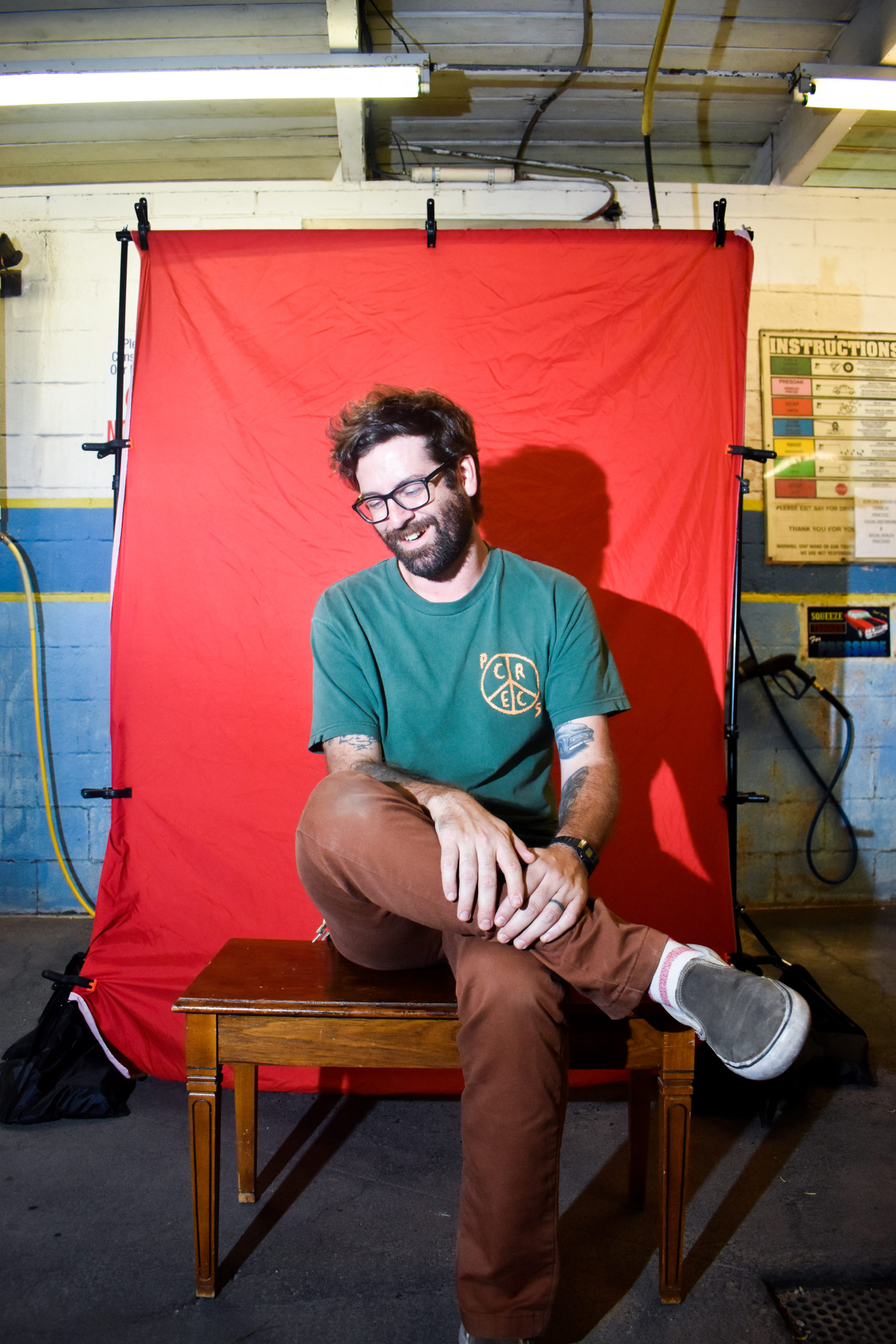
WILLIAMS: Do you think the music you make could still be called folk punk? Do you even care?
BONNETTE: I don’t really care. I used to be irked by it, but it’s not my business to get irked by it. That doesn’t help. There are a lot of folk-punk bands that I’m super honored to be in the company of, that’s for sure. But I think our band is a little bit different than that.
WILLIAMS: You mentioned recently, I think you had played a song on your livestream that you hadn’t officially released. You said you used to be so much more precious about keeping your songs from getting out, but now it’s like all you want to do is put your songs up online. Can you tell me a bit about that?
BONNETTE: I mean, all we have now is online. To me, it just feels like it makes more sense to put it out there and allow everyone to hear it forever. That’s what “live” is, currently, to me. In the past, where I was more precious about writing “albums,” letting a song slip out before it was finished, even though I think performing it is part of the process of writing it, caused me some anxiety.
WILLIAMS: Do you remember the last concert you went to before everything shut down?
BONNETTE: I was gonna go see Ezra Furman after getting back from that last tour, but I was a little under the weather and I didn’t want to give Ezra a cold in case I happened to run into them. So that was the last show I almost went to. The last concert I went to… oh, my wife and I saw Jenny Lewis and Karl Blau.
WILLIAMS: I wanted to ask you about hope, specifically about what maybe on the left gives you hope, and in preparation for this interview, I looked up one of the more recent interviews you’d done, and it was in February 2020, probably when you were doing that tour. And the guy interviewing you asked you how you were going to survive 2020 “with the election coming up, and everything.” And your answer was basically, “Bernie Sanders.” So, in March of 2021, what gives you hope?
BONNETTE: [Laughs until he cries] Um, that’s a good question. Human beings’ ability to adapt to whatever terrible situation they find themselves in. I do have more hope than that, but I guess that’s something you need to account for.
WILLIAMS: One of your songs is entitled “Mega Guillotine.” If you had a mega guillotine, who would you use it on?
Bonnette: I don’t think I’m legally allowed to answer that question.
WILLIAMS: Fair. If you had a banana phone, a la folk singer and Antifa legend Raffi, who would you call?
BONNETTE: [Laughs] Kyrsten Sinema, Chuck Schumer, Nancy Pelosi, Joe Biden. I’d call them to ask what the big idea is. They have power now. What are they doing? Make our lives better like you said you were going to! They’re not the answer, though. We have each other. That’s what we have.
WILLIAMS: Another one of your songs, “Body Terror Song,” has become something of a hit on TikTok. Did you ever think you’d see something like that? How does it make you feel?
BONNETTE: It makes sense that TikTok is a huge delivery source for music these days. It’s somewhere toward the end result of singles getting popular again. They’re just getting smaller and smaller until they’re broken down into the barest hooks. And that’s great, cause I write good hooks. But also, I love that song, because I started out writing about myself and my own body, which I have very little to complain about most of the time, unless I’m dealing with an injury, which I’m prone to. But the fact that everyone has a body makes that song pretty resonant for a lot of people.
WILLIAMS: It feels like a dysphoric dirge. I don’t suffer from dysphoria, but I have some disabilities and I can relate to the exhaustion of having to live inside of the body that’s been given to you. Have you gotten any messages from the trans community in particular about that song?
BONNETTE: Oh, tons. When that song started getting traction among people, we decided to make a music video for it which had a lot of symbolic messages to trans people. And… hi guys, you’re beautiful. I don’t really know what to say, other than that it’s really humbling and cool.
WILLIAMS: I have one more thing I’d like to talk to you about, and that is: for some reason, nine years ago I asked you one night via Facebook for songwriting advice, which is strange, because I don’t write songs, but I guess I was trying to back then. You said that you hate giving advice, but politely obliged. Here’s what you had to say: “Be honest with yourself, avoid writing to the lowest common denominator, keep it weird, and don’t allow yourself to be pigeonholed.” Nine years later, would you say that those are tips you’ve stuck to?
BONNETTE: Yeah, I think so. Wow. That was nine years ago? I think I used to be smarter. That’s very good advice, and I don’t think I would give such good advice these days.


